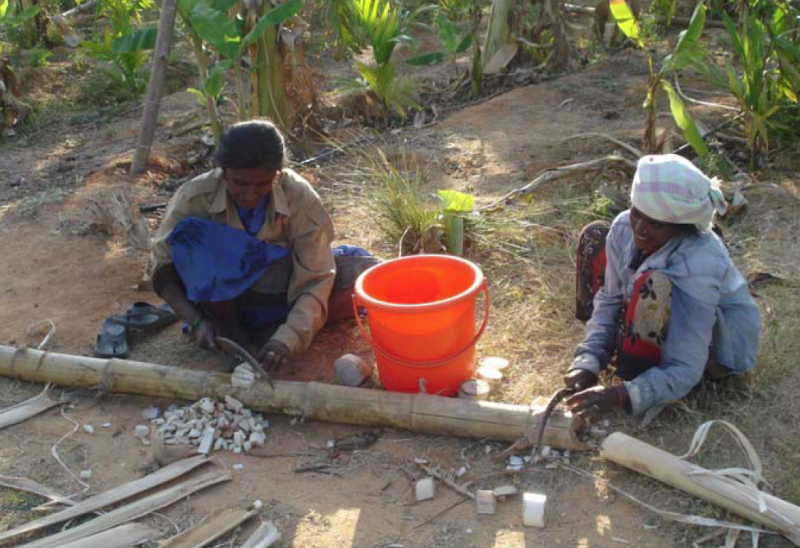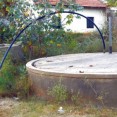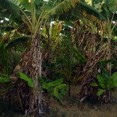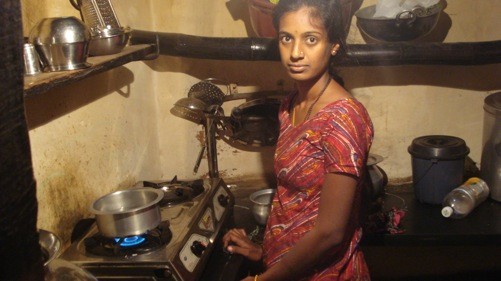To provide clean cooking fuel at village level while improving income opportunities and giving appropriate treatment to crop residues
 Small plots of farmland (less than 2.5 acres (1 ha)) are the main livelihood asset for many rural families in India. Several constraints, such as a lack of irrigation and access to appropriate finance services, lead to low productivity levels and subsistence agriculture. At the same time, the combustion of solid biomass in inefficient stoves is still the main cooking option in rural India. The Asian Regional Energy Initiative of the IEI demonstrated one option to address these and other pressing issues by integrating two main measures: a) the establishment of banana plantations using micro-irrigation and other sustainable farming methods and b) the development of a village biogas distribution system, fed by biogas generated from the plantations' organic residues.
Small plots of farmland (less than 2.5 acres (1 ha)) are the main livelihood asset for many rural families in India. Several constraints, such as a lack of irrigation and access to appropriate finance services, lead to low productivity levels and subsistence agriculture. At the same time, the combustion of solid biomass in inefficient stoves is still the main cooking option in rural India. The Asian Regional Energy Initiative of the IEI demonstrated one option to address these and other pressing issues by integrating two main measures: a) the establishment of banana plantations using micro-irrigation and other sustainable farming methods and b) the development of a village biogas distribution system, fed by biogas generated from the plantations' organic residues.
Four small farms near the village of Gundigere (in south-east Karnataka) were selected for establishing banana plantations of 1.5 acres (0.6 ha) each. Two floating drum biodigesters produce biogas mainly from banana stalks and non-productive stems from the plants. Through a network of pipelines, the biogas is distributed to 70 households and used for cooking purposes.
The project was undergoing an upscaling phase, which formed part of the original contract. More information can be found at the bottom of this page.
Technology, Operations and Maintenance
 Securing water supply was central for the operation of both the plantations and the biogas distribution system. To achieve this, two wells were drilled and one 7.5 Hp (5.6 kW) submersible water pump, as well as corresponding piping and valves, were installed. Establishing the plantations involved several soil preparation measures, the installation of piping systems for drip-irrigation and the planting of saplings obtained from a local agricultural agency. In order to secure a regular supply of bananas throughout the year (and, as a result, a constant flow of income and substrate) planting was carried out in several installments. Two digesters of 35 m3 gasholder capacity were constructed. These are fed with stems from the banana plants, which first have to be chopped manually into cubes of ca. 2 cm. Biogas is distributed to 70 houses through networks of rigid PVC pipes with a total length of 600 m. Families purchased a two burner gas stove of their choice from markets in nearby towns.
Securing water supply was central for the operation of both the plantations and the biogas distribution system. To achieve this, two wells were drilled and one 7.5 Hp (5.6 kW) submersible water pump, as well as corresponding piping and valves, were installed. Establishing the plantations involved several soil preparation measures, the installation of piping systems for drip-irrigation and the planting of saplings obtained from a local agricultural agency. In order to secure a regular supply of bananas throughout the year (and, as a result, a constant flow of income and substrate) planting was carried out in several installments. Two digesters of 35 m3 gasholder capacity were constructed. These are fed with stems from the banana plants, which first have to be chopped manually into cubes of ca. 2 cm. Biogas is distributed to 70 houses through networks of rigid PVC pipes with a total length of 600 m. Families purchased a two burner gas stove of their choice from markets in nearby towns.
Financial Issues & Management
A cooperative was formed for taking over the operation and management of the established systems. The cooperative consists of one representative from each village family. "Share-cropping" agreements were created with the four owners of the land where the banana plantations were established. In return for the improvements made to their land, the landowners have to deposit 50% of their net revenue from selling the bananas into the cooperative's bank account for the first seven years of operation. The supply of biogas to each household is linked to a monthly flat tariff of about €2.86. Additional revenues may eventually result from the sale of the digester effluents as organic fertilizer. This combination of cash inflows enables the cooperative to keep the biogas supply tariff low. The monthly tariff covers operational and maintenance costs, while the share of banana sales revenue covers a large proportion of the capital costs.
Environmental Issues
 By replacing biomass with biogas for cooking purposes, the emission of health-damaging pollutants has been significantly reduced in 70 households. This also results in the avoidance of around 730 tonnes of CO2 per year. In addition, by using the effluents from the anaerobic digestion process for fertilising the banana plantations, the project is contributing to closed loops of soil nutrients and avoiding the need for chemical (petroleum-based) fertilisers. The project also has the impact of waste reduction, due to the fact that the banana plant residues are used.
By replacing biomass with biogas for cooking purposes, the emission of health-damaging pollutants has been significantly reduced in 70 households. This also results in the avoidance of around 730 tonnes of CO2 per year. In addition, by using the effluents from the anaerobic digestion process for fertilising the banana plantations, the project is contributing to closed loops of soil nutrients and avoiding the need for chemical (petroleum-based) fertilisers. The project also has the impact of waste reduction, due to the fact that the banana plant residues are used.
Social Issues
 Currently, four people are employed to operate and maintain the system. They have been trained in all the daily tasks required for the maintenance and continuous operation of the digesters and biogas supply, as well as in keeping records of operational parameters and monthly biogas supply payments. In addition to these permanent jobs, the operation of the plantation involves labour-intensive activities. This creates seasonal jobs for the local population, particularly at harvest time.
Currently, four people are employed to operate and maintain the system. They have been trained in all the daily tasks required for the maintenance and continuous operation of the digesters and biogas supply, as well as in keeping records of operational parameters and monthly biogas supply payments. In addition to these permanent jobs, the operation of the plantation involves labour-intensive activities. This creates seasonal jobs for the local population, particularly at harvest time.
Results & Impact
 During the first year of harvest (between January and August 2013) around 63 tonnes of bananas were sold. This generated approximately €9,500 for the cooperative from the "share-cropping" agreement.
By the end of December 2013 all 70 houses had been connected to the biogas distribution network. By the conclusion of the project implementation phase, the biogas was supplied for 9 hours per day: 4 hours each morning and evening and 1 hour in the afternoon. This already meets most cooking needs and the users have expressed their satisfaction. It is anticipated that the biogas supply period will be increased even further in future.
During the first year of harvest (between January and August 2013) around 63 tonnes of bananas were sold. This generated approximately €9,500 for the cooperative from the "share-cropping" agreement.
By the end of December 2013 all 70 houses had been connected to the biogas distribution network. By the conclusion of the project implementation phase, the biogas was supplied for 9 hours per day: 4 hours each morning and evening and 1 hour in the afternoon. This already meets most cooking needs and the users have expressed their satisfaction. It is anticipated that the biogas supply period will be increased even further in future.
Replicability
The results achieved by the end of the project implementation phase indicate that the proposed concept can repay 100 % of the financial investment within seven years of operation (not taking loan interest into account). This means that the concept can offer a meaningful alternative for the rural population to improve their access to clean energy, while increasing food production, employment and earning opportunities for small farmers. The main conditions for replicating the project concept are:- Appropriate climate and soil for banana growing
- The availability of sufficient water resources
- Village structures with houses clustered near each other
- Some background of communal cooperation among villagers
Lessons learned
The project has demonstrated that a biogas system can be based solely on stem-waste from banana plantations, although the methane generation potential of these parts of the plant is much lower than that from fruit and peel. Some other noteworthy lessons are:- Appropriate timely distribution for planting new saplings is crucial to avoid strong fluctuations in the availability of substrate and income.
- Access to transportation for taking harvest to nearby markets at the right time is important in order to ensure the proper marketing of the produce.
- The demonstrated concept is labour-intensive and labour costs account for a large share of the operational costs. If wages were to rise substantially, the gas tariffs would have to be raised accordingly.
Upscaling Strategy
After the successful implementation of the first project phase, WISIONS continued to support IEI in its aim to scale up the demonstrated concept in a second phase. The main objectives of the upscaling activities from 2014 until 2016 included:- The installation of drip irrigation systems and biodigesters in other locations,
- The training of farmers and other users, and the assessment of financing options for the new technologies,
- The home delivery of gas for cooking purposes and, finally,
- The demonstration that these benefits are replicable.
Projects with same technology
Exchange: Consolidating the Adoption of Small and Medium-Scale Biogas Technology by Livestock Farmers in Costa Rica
This exchange activity aims to implement a collaborative process seeking to (i) consolidate the use of biodigester technology in Costa Rica and (ii) accelerate the adoption of biogas solutions by small and medium-scale livestock farmers in the country.
Energy enterprises for development in rural areas: the case of clean cooking fuel
To develop and operate a sustainable rural demonstration project: a community dairy biogas enterprise
Projects in same country
Rural Microenterprise Model For Biofuel Extraction In India
Renewable Energy and Energy Efficiency in the Urban Health Sector - Bhubaneswar City Health Services
To improve health services for the poor in the city of Bhubaneswar, resulting in greater local socio-economic development and reduction in fuel poverty